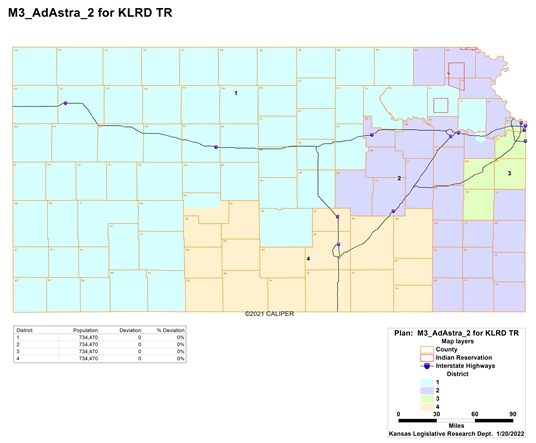
The Kansas Supreme Court today denied Attorney General Derek Schmidt’s petition for mandamus and quo warranto relief in a redistricting case.
The attorney general had asked the Kansas courts to dismiss two pending lawsuits filed in Wyandotte County District Court and a third lawsuit filed in Douglas County over redistricting.
The lawsuits alleged that the Congressional reapportionment map passed by the Kansas Legislature was impermissibly gerrymandered and violated the Kansas Constitution.
The Supreme Court held today that mandamus and quo warranto were not appropriate remedies because the district judges below had not violated any clear legal duty nor were they unlawfully asserting authority by hearing the cases.
Also, the court clarified that if an action does not lie in mandamus or quo warranto, the petition must be denied.
The Supreme Court stated that it has no discretion to reach the merits of such a claim simply because the question presented is one of statewide importance, significant public concern, or there is a compelling need for an expeditious and authoritative legal ruling on an important legal question.
The lawsuits filed had named Kansas Secretary of State Scott Schwab and Wyandotte County Election Commissioner Michael Abbott as the defendants.
The two Wyandotte County cases were filed Feb. 14, and the Douglas County case was filed March 1. Attorney General Schmidt filed a response seeking dismissal on Feb. 18, and an amended petition on March 3.
In addition to the gerrymandering allegations, the plaintiffs’ lawsuits claimed the Kansas Legislature racially gerrymandered the districts to intentionally dilute the minority vote.
Writing for the majority, Justice Caleb Stegall stated that they realize time is of the essence, with the filing deadline June 1 and the primary election scheduled Aug. 2.
However, there are claims in the district court actions that may require fact-finding by the lower courts, according to the opinion issued Friday. District courts are better equipped to try questions of fact, according to the opinion.
“A court may choose to exercise its discretionary jurisdiction in an original action only to conclude—as a matter of law—that the specific petition before it does not lie in mandamus or quo warranto,” Justice Stegall wrote. “And if an action does not lie in mandamus or quo warranto, the petition must be denied. This court does not have discretion to reach the merits of such a claim simply because the question presented is one of statewide importance, significant public concern, or there is a compelling need for an expeditious and authoritative ruling on an important legal question. Language in our prior decisions suggesting otherwise (or interpreted as suggesting otherwise) is expressly disapproved.”
“For mandamus to lie in this case, petitioners must show that a mandatory, nondiscretionary duty requires Judge (Bill) Klapper and Judge (Mark) Simpson to dismiss the cases,” Justice Stegall wrote. “No such mandatory duty exists, and no clear legal duty has been violated.”
The court also added that it did not reach, consider or take any positions on the merits of the underlying claims of the lawsuits. The court encouraged the parties to work with the district courts to expeditiously resolve the legal questions and to present a timely appeal, should anyone desire an appellate review.
“We’re obviously happy with this ruling,” said ACLU of Kansas Executive Director Micah Kubic, in a statement. “Still, there’s a lot of work yet ahead of us in defending democracy and protecting the rights of Kansans, especially the voters of Wyandotte County, Johnson County and Lawrence.”
“We are eager to get the case moving in Wyandotte County District Court so that we can show just how blatant of a partisan and racial gerrymander this map is, and how it tramples on the state constitutional rights of our clients,” said Sharon Brett, ACLU of Kansas legal director. “We look forward to putting on our evidence and demonstrating our case.”
The plaintiffs in Alonzo et al. v. Schwab asked Wyandotte County District Court Judge Bill Klapper to do so in their original motion to expedite.
Late last month, the ACLU of Kansas and the Campaign Legal Center along with pro bono assistance from Arnold and Porter Kay Scholer LLP, filed suit in Wyandotte County District Court seeking to block the recently enacted congressional redistricting map.
The suit, Alonzo et al. v. Schwab, against Kansas Secretary of State Scott Schwab and Wyandotte County Election Commissioner Abbott, was filed on behalf of 10 plaintiffs who live in Johnson or Wyandotte counties and an additional plaintiff who lives in Lawrence.
The suit argued that the new map cracks the most racially diverse county in Kansas in half in a brazen attempt to dilute the voices of minority voters. The lawsuit argued that the congressional map constituted partisan and racial gerrymandering, violating the equal rights and political power clauses, free speech and free assembly clauses, and the right to suffrage provisions of the Kansas Constitution.
Kansas Attorney General Derek Schmidt today issued a statement after the Kansas Supreme Court denied the state’s petition:
“We had hoped to resolve the unsettled constitutional questions in these unprecedented cases more quickly and efficiently by presenting them directly to the Kansas Supreme Court,” Schmidt said in the statement. “But today’s decision requires we resolve them the slower and potentially far more expensive way by starting in the trial courts, so that is what we will do.”
To see today’s decision, visit
https://www.kscourts.org/KSCourts/media/KsCourts/Opinions/124849.pdf?ext=.pdf.
